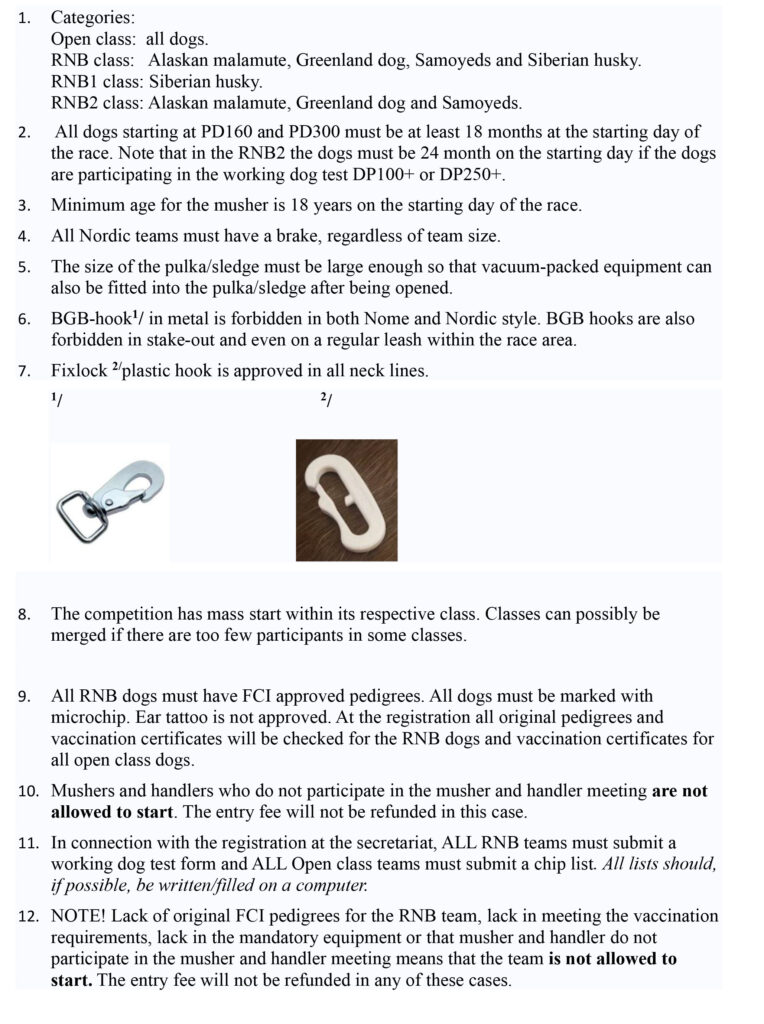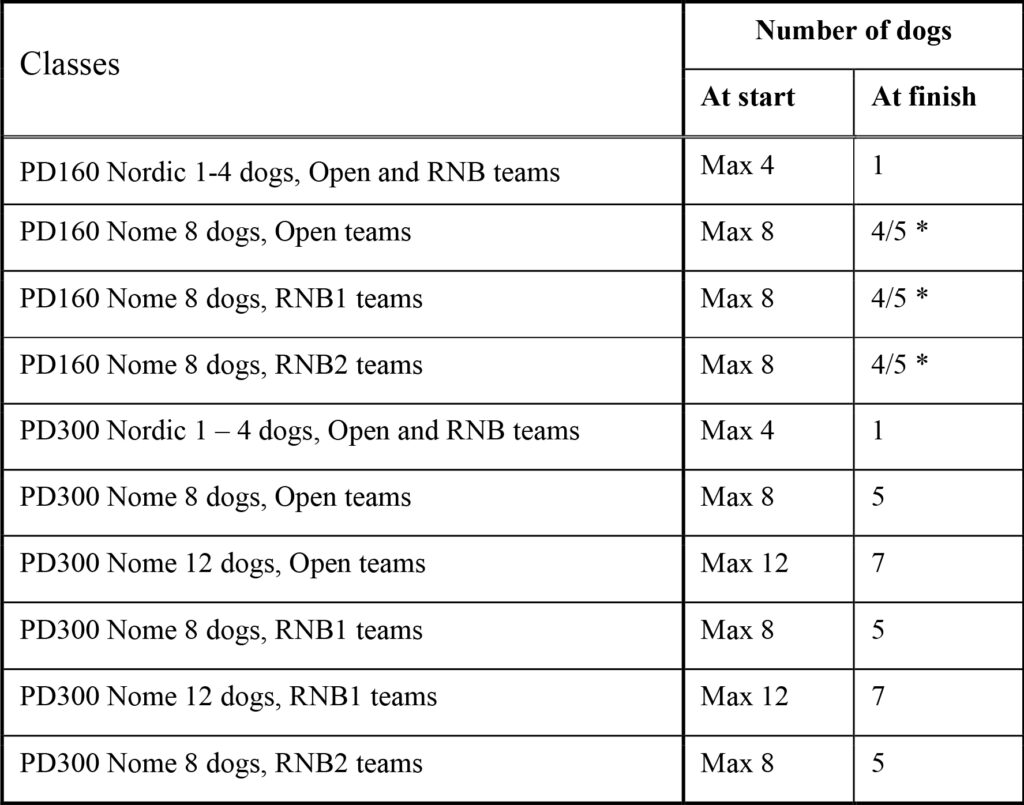RACE RULES
Here you will find a version for printing.
RACE RULES FOR POLARDISTANS 2024
The race follows IFSS regulations: International Federation of Sleddog Sports Race Rules and the additional national regulations as well as the additional rules that apply to Polardistans (see below).
All competitors must have read and understood the Polardistans policy for dog welfare.
Polardistans 160 is approximately 160 km and Polardistans 300 is approximately 300 km.
Both competitions are open for registered purebreed polar dogs of the breeds Alaskan malamute, Greenland dog, Samoyeds and Siberian husky (RNB breeds) as well as Open class dogs.
ADDITIONAL RULES POLARDISTANS

 */ With 5 or 6 dogs at the start, at least 4 dogs must come to the finish line.
*/ With 5 or 6 dogs at the start, at least 4 dogs must come to the finish line.
*/ With 7 or 8 dogs at the start, at least 5 dogs must come to the finish line.
MUSHERPASS, INSURANCE AND “COMPETITOR CONSENT FORM”
Swedish competitors must have a so-called ”Green Card” and a private accident and liability insurance. In connection with the registration in the secrtariat Non-swedish competitors must be able to provide documentation (preferably in English or German) of a private accident and liability insurance, which covers this form of sporting activity.
ALL competitors must submit a signed “competitor consent form” to the secretariat in connection with registration.
TRAIL MARKINGS
The trail runs mainly along marked snowmobile trails. The trail marking is complemented by race signs with reflective tapes and warnings at road crossings.
We follow the IFSS regulations for trail markings. You can read more about this on the IFSS website.
SEARCH AND RESCUE
Search and rescue operations will normally be initiated 24 hours after last contact. Therefore, unnecessary stops between checkpoints should be avoided. If a situation occurs and a search and/or rescue action is needed prior that 24 hours, the decision is made by the race organization together with the mountain rescue team or equivalent. Competitors must always have enough food and equipment to survive on their own and be able to take care of the dogs for at least 24 hours.
The emergency rations, both for musher and dogs can be used 24 hours after the team left the latest checkpoint. In other words: this means that a musher at any time must ensure that he/she has sufficient amount of food for himself /herself and the dogs when leaving the checkpoint.
MANDATORY EQUIPMENT
The list of mandatory equipment can be found on the website. Dates and times for equipment control can be found in the program on the website. If the equipment is not complete and approved by the race judge, the team will not be allowed to start. The equipment control must be completed prior to the musher and handler meeting. Random inspections will be carried out during the race. The equipment will also be controlled at the finish line.
Mandatory equipment that is lost or broken during the competition can be replaced at a checkpoint against a time penalty of one (1) hour. Any replacement or change of equipment must be approved by the race marshal/race judge or the checkpoint manager and it is to be noted in the checkpoint files and reported to the secretariat. If mandatory equipment is missing during the random inspections during the race or at the inspection at the finish line the team gets a time penalty of 3 hours.
START and FINISH
Polardistans has a mass start in all classes. The start area is down on a frozen lake at Särna Camping. Dates and times for the starts can be found in the program on the website. Classes with few participants may be merged.
On the starting line poles are drilled into the ice, one post per team. It is important that the starting line is attached to the pole as low as possible on the pole, recommended at the ice level. There will be plenty of time to get the teams ready on the starting line between the start of the classes.
There will be some snow mobiles and some volunteers available for those teams who needs assistance to get down to the starting line.
The finish line will be at Särna camping in front of the main building. The official time for the latest arrival can be found in the program at the website.
REINDEER AREA
The trail runs through reindeer grazing land, therefore the dogs must be kept under strict control in these areas. Competitors are responsible for any damage his/her team causes to reindeers.
VETERINARY HANDBOOK
Each competitor receives a veterinary handbook upon registration. This must be given to the veterinarian at the checkpoint in connection with the mandatory veterinary check. A team may not leave the checkpoint without the veterinary handbook being signed.
- No dogs may be dropped off without a veterinary inspection. All dropped dogs must be noted in the veterinary handbook. The veterinarians can request a re-check at any time before a team is allowed to continue the race or require a re-check at the next checkpoint.
- Re-check may also be required at the checkpoint for Polardistans 160 km.
- Injuries to dogs must be reported to the veterinarian and noted in the veterinary handbook. The veterinarian reports injuries to the race organizer.
- It is the participant’s responsibility to ensure that the veterinary handbook is signed by the veterinarian att all inspections.
- At the finish line, the veterinary handbook must be handed over to the veterinarian who checks the team.
- Lost veterinary handbook results in disqualification!
DOGTAGS
All dogs starting at Polardistans must be marked with dog tags attached to the dogs’ collars. The dog tags are handed out at the vaccination check in the secretariat in connection with registration.
WILDERNESS CHECKPOINT
Along the trail is a checkpoint the competitor must pass. Polardistans 300 passes the checkpoint twice (2) and Polardistans 160 once (1). At the checkpoint, it is possible to get water and straw and leave an injured or sick dog. The competitor is responsible for a dropped dog is being picked up from the checkpoint by the handler.
The deadline for leaving the checkpoint is in the program at the website. All teams must have left the checkpoint at the specified time. Teams leaving the checkpoint after the specified time are scratched from the race. The closing time can be extended by the race jury.
If a musher enters a car/motorhome/caravan/house or similar, he/she may not continue the race.
MANDATORY REST
Polardistans 160 has one (1) mandatory rest of 20 minutes, which is taken at the wilderness checkpoint in Öjvasseln. The rest can be extended if desired. Please notify the volunteer upon arrival to the checkpoint if you are planning a longar rest.
Polardistans 300 has two (2) mandatory rests – a rest of four (4) hours and a rest of six (6) hours. These must be at the wilderness checkpoint in Öjvasseln and cannot be taken as one stop. Rests can be taken in a voluntary order. The rests can be extended if desired.
MUSHER AND HANDLER MEETING
The musher and handler meeting is mandatory for all mushers and handlers. Dates and times for meetings can be found in the program on the website.
HANDLER
The handler may help at the start and finish area to take care of the musher’s dogs. At the checkpoint the handler may help to lead the team in and out from the checkpoint and help the team to park at the designated pole. The handler may stand guard behind the sledge if the musher is sleeping, but are not in any way allowed to help with the dogs. Only the handler of the team is allowed around the team at the checkpoint area.
When the team is parked at the designated parking pole, the pole has to be marked with the starting number (applies only to PD300). The handler or the musher is responsible to bring the starting number for the parking pole. The number is received at the registration in the secretariat. The team will be parked at the same pole when coming into the checkpoint the second time. This is to minimize the spread of potential infection.
Dropped dogs are handed over to the handler at the designated parking pole. No dogs can be taken out of the race without a veterinarian check!
If a musher does not have a handler, he/she has to notify this upon registration in the secretariat. If a handler is helping several teams, this must also be notified in connection with the registration.
DEPOT AND DEPOTBAGS – applies only for PD300
The mushers bring their own bags and the handlers are responsible for the bags being available at the right place at the right time at the checkpoint.
The bags must be clearly marked with name and starting number of the team. The bags may only contain cold or dry dog food (not soaked/wet or heated food and no cooling bags or boxes) and a dog cover for each dog as well as a blanket per dog. The musher himself/herself has to get the bag from the designated area and return the empty or used bag/bags to the same location. The handler is responsible for removing the empty or used bag/bags –and it also applies if the team drops out of the race. Control of the depot bags will be done at the checkpoint.
N.B! Only dogfood, dog covers and blankets for the dogs are allowed in the depot bag.
WATER AND STRAW
Water and straw are available at the checkpoint for all teams. Water cans must be returned to the same place from which they were collected as soon as possible. It is the handler’s responsibility to remove the straw, according to the volunteer’s instructions, when the team leaves the checkpoint.
BIBS
In connection with the registration in the secretariat the musher receives a BIB with the starting number. The BIB has to worn by the mushers during the entire competition. The handler BIB is handled out in the secretariat during the registration. The handler BIB has to be worn by the handlar as soon as he/she is around the team in the start and finish area as well as at the checkpoint.
DOGS IN CAR
Dogs that are taken into a car/mobile home/caravan/dogtrailer/box, house or similar during the race may not continue the race.
HELP
A volunteer and/or a handler may help to guide the team in and out of the checkpoint. The volunteers direct the team to a designated pole for a shorter or a longer stop. Mushers are not allowed to receive any other help during the race other than to control, slow down and keep the team at the checkpoints. Help to get the team moving is not allowed.
In case of a broken pulka/sledge/ski/ski pole, the musher may get help from the handler. The handover of the replacement equipment shall take place at checkpoint unless something else is approved. The change of equipment must be approved by the race marshal, race judge or checkpoint manger. The musher must repack the sledge/pulka and then leave the damaged pulka/sledge/ski/ski pole to the handler.
Otherwise, no help is allowed during the race.
DEAD DOG
If a dog dies during the race, it must be transported to the checkpoint/finish. The dog must be transported in the sledge and be covered upon arrival at the checkpoint/finish. The musher must contact the veterinarian or the race management upon arrival. If possible, the musher or his/her handler must notify the veterinarian or the race marshal that a dog has died. If possible, the dog can be picked up at another agreed location. The musher can continue the race if an initial check shows that the dog has died from causes other than neglect.
PROTEST
Any protest must be notified in writing on the prescribed form, no later than one (1) hour after arrival at the finish line.